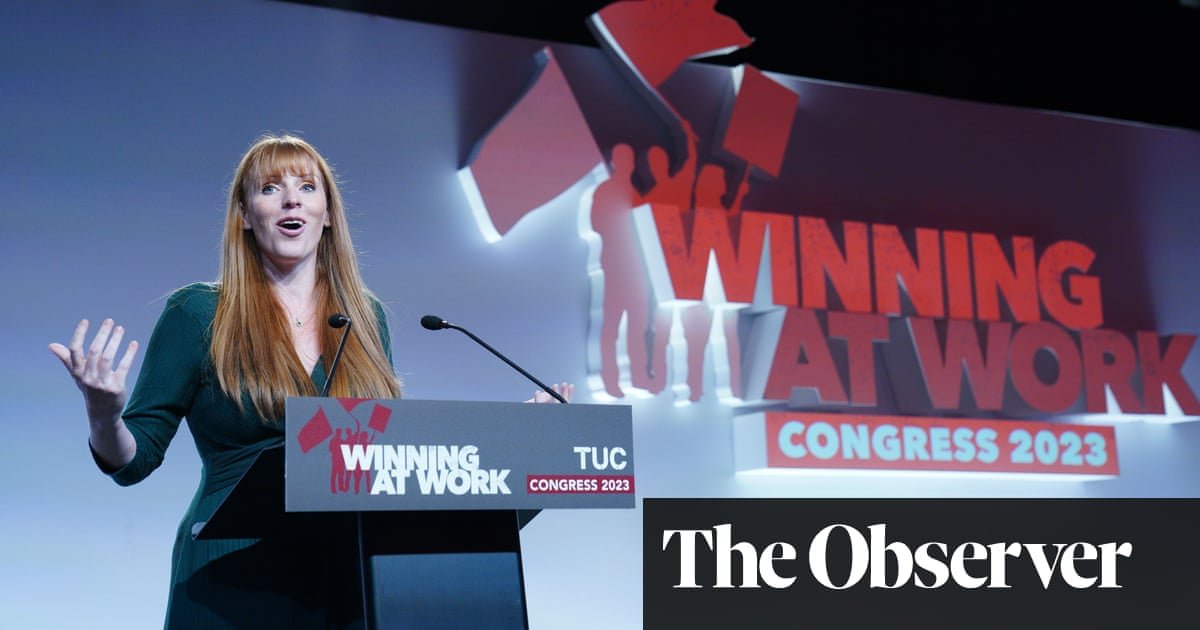Twelve months ago, when the TUC met for its annual bash in Liverpool as Labour stood on the brink of power, Keir Starmer’s message to union leaders was “eyes on the prize”.
Fresh from thrashing out the details of Labour’s workers’ rights package – the new deal for working people – in late-night talks, union leaders were upbeat.
As this year’s TUC congress opens in Brighton on Sunday, the backdrop is a transformed political landscape – and the unions will be reminding the government they expect it to deliver.
Deputy prime minister Angela Rayner has promised an employment bill, implementing key aspects of the new deal for working people, within 100 days of coming to power: a deadline that will expire in mid-October.
As the days tick down, business has been sounding the alarm about aspects of the plans, which include banning “exploitative” zero-hours contracts, outlawing fire and rehire, and getting rid of the three-day wait before workers are entitled to sick pay.
The Institute of Directors (IoD) suggested last week that the workers’ rights plans, alongside the chancellor’s warnings of tax increases, were partly responsible for a drop-off in confidence among its members.
“The news flow in recent weeks on employment rights and autumn tax rises has dented confidence in the environment for business in the UK,” the IoD’s chief economist, Anna Leach, claimed. “As we head into a busy autumn, we are calling on the government to take time to get policy design right for the long term and deliver the stable tax and policy framework needed to drive business confidence and investment.”
These noises off make unions nervous: they trust Rayner, and have no doubt the government will implement its workers’ rights plans – but they are also aware that the details of the measures will be key. On zero-hours contracts, for example, the promise in the workers’ rights document published alongside Labour’s manifesto was to ensure that “everyone has the right to have a contract that reflects the number of hours they regularly work, based on a 12-week reference period.”
As Nye Cominetti of the Resolution Foundation pointed out last week, the government has not yet made clear whether that means workers would in effect have a right to a minimum number of hours every week (or every fortnight or month), and whether it would apply to all workers or only those who already work regular hours – who would then see that formalised.
“Decisions about eligibility for this new right, and on whether a worker’s hours are guaranteed every week, affect not just how much additional security workers would gain, but also how much flexibility employers would lose,” he said in an analysis of the plans. He argued that could be problematic for businesses facing genuinely fluctuating demand – such as in hospitality.
after newsletter promotion
Here and on many details of the new deal for workers, ministers will have to make crucial decisions about trade-offs. On some aspects of the agenda, including collective bargaining for the social care sector and a consultation on abolishing the “worker” status that applies to many gig economy staff, there is also union concern about bolder policies being kicked into the long grass.
Starmer, Rachel Reeves and other senior Labour frontbenchers held fraught talks with union leaders in May, not long before the election was called, after a hamfisted attempt was made to water down the plans by ditching the policy forum document and tabling a new draft. The assembled general secretaries made clear they were not willing to start afresh after previously negotiating the text of the deal line by line.
Peace broke out after the rewrite was abandoned and Labour agreed to implement the original package in full, but union insiders say they remain alert for backsliding. Starmer’s keynote speech in Brighton on Tuesday will be closely watched.
Jubilation at the arrival of the first Labour government in more than a decade is also likely be tempered by anxiety about Reeves’s tough stance on the public finances.
Unite’s Sharon Graham is likely to renew her calls for more significant investment to fix crumbling public services. Most other union leaders are expected to remain publicly loyal – Graham’s iconoclasm is not a surprise. But some union figures share the nagging disquiet across the left about whether the caution that helped Labour sweep to power will restrain it in government from delivering the change it promised.
But with Reeves’s first budget yet to come, and the employment bill due within weeks, this week’s shindig in Brighton is likely to be a celebration of a new political era, in which unions are back at the top table.
